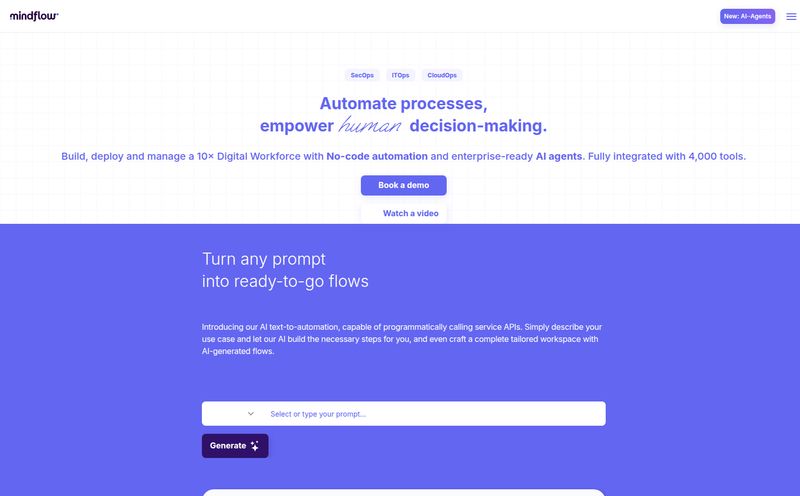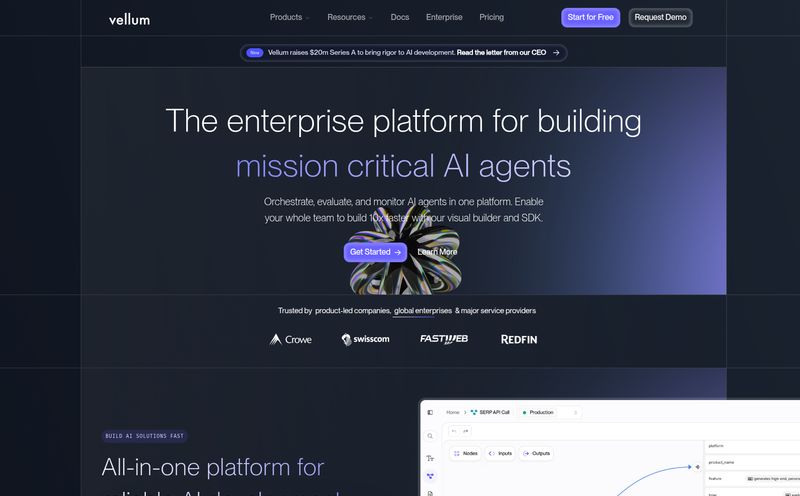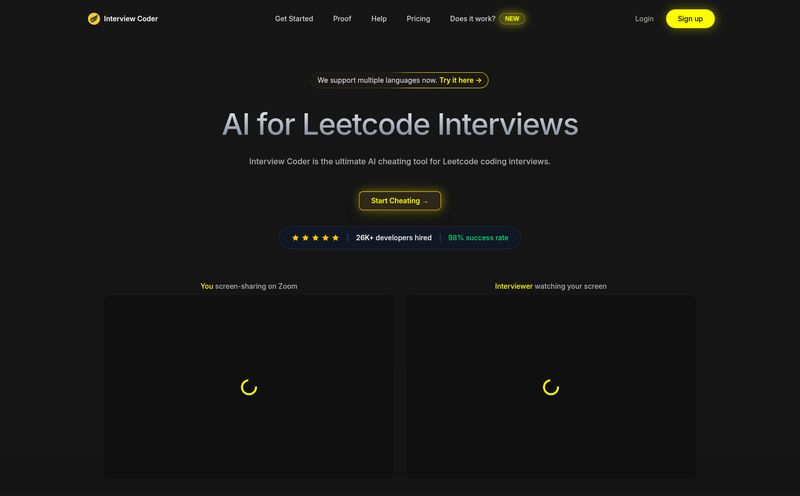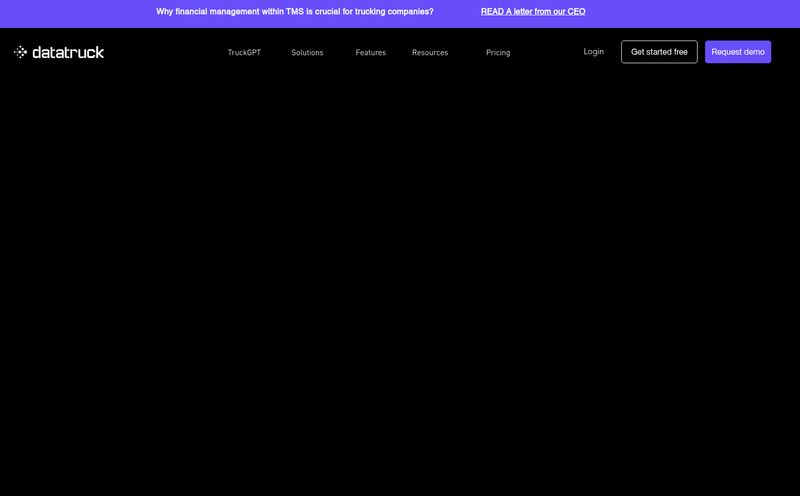Onboarding new hires can be a special kind of chaos. You’ve got the excitement of a new team member, the promise of fresh ideas… and then the reality hits. The endless checklists, the forgotten passwords, the frantic Slack messages: “Hey, does anyone know who gives out the Figma access?” It’s a mess. For years, I’ve seen companies, big and small, fumble this critical first impression. They talk a big game about culture, but their welcome mat is basically a tangled mess of spreadsheets and hope.
And when you're onboarding developers? Oh boy. It's the same chaos, but with an added layer of technical complexity involving repositories, environment setups, and a dozen different API keys. The first week of productivity is often a wash, spent just trying to get a local dev environment to compile. It's a massive, expensive time-sink.
So when I saw Silo Team pop up—spotted it on Product Hunt, actually—touting itself as “the fastest way to onboard and offboard people” using AI, my curiosity was piqued. AI is the buzzword of the decade, slapped onto everything from toasters to toothbrushes. Is this just more marketing fluff, or is there something genuinely useful here? Let's take a look.
The Onboarding Nightmare We All Secretly Live In
Before we get into the tool itself, let's just sit with the problem for a second. Bad onboarding isn't just an annoyance; it’s a killer of productivity and morale. I remember one job where my first three days were spent in a windowless room with a laptop that didn’t have admin rights. Fun times. Studies from places like the Society for Human Resource Management (SHRM) have shown for years that a structured onboarding process is directly linked to higher employee retention. A bad one can cost you a new hire within the first year.
It’s the silent killer of team velocity. Every minute a manager spends hunting down an IT admin is a minute they're not strategizing. Every hour a new developer spends wrestling with permissions is an hour they’re not shipping code. We've just accepted this as the cost of doing business. But should we?
So, What is Silo Team, Really?
At its core, Silo Team is an automation platform designed to streamline the entire employee lifecycle, from the moment they sign the offer letter to their last day. The big hook is its use of AI to generate onboarding and offboarding plans, or “journeys.”
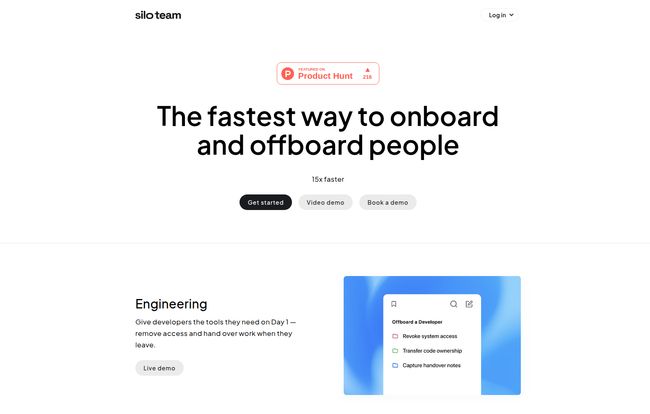
Visit Silo Team
Instead of you manually building a checklist in Notion or Asana, Silo Team suggests a path based on the role. Onboarding a new Senior Backend Engineer? It will likely generate a template that includes tasks like:
- Grant access to the main monorepo on GitHub.
- Add to the #backend-devs Slack channel.
- Schedule a 1-on-1 with the lead architect.
- Send over documentation for the payments API.
It’s designed to be the central nervous system for your people operations, connecting the dots between HR, IT, and the actual hiring manager. It’s less of a static checklist and more of a dynamic project manager for new hires.
The Features That Actually Matter
A tool is only as good as its features, right? Here’s what stood out to me from their site and what it means in practice.
AI-Powered Templates Are the Starting Gun
This is the main event. The idea is that you don't start from a blank slate. Silo Team uses AI to give you a pre-built plan for various roles. Their website even shows specific use-cases for Engineering, Finance, Sales & Marketing and Healthcare. This is smart. The needs of a new salesperson (CRM access, sales decks, lead lists) are wildly different from a new nurse (HIPAA training, system access, compliance docs).
Of course, the cynical SEO in me knows this is a double-edged sword. The effectiveness of these templates depends entirely on their quality. It's a great starting point, but you'll almost certainly need to tweak and customize them to fit your company's unique, slightly weird, processes. But starting from an 80% solution is a hell of a lot better than starting from 0%.
Integrations Are Everything in 2024
I cannot stress this enough: any new tool that doesn't play nicely with your existing stack is dead on arrival. Silo Team seems to get this. They highlight integrations with the usual suspects like Slack and Notion. This is critical. The goal of automation is to reduce friction, not to create a new information silo (see what I did there?).
If Silo Team can automatically create a user in one system, post a welcome message in Slack, and assign a task in Jira, all from one central command, then it’s providing real value. It’s connecting the disparate tools that most modern companies run on.
Don't Forget About Offboarding
This is the feature that, for me, elevates Silo Team from a “nice-to-have” to something genuinely important. Offboarding is the unglamorous but critical sibling of onboarding. Done poorly, it's a massive security risk. How many companies have former employees still lingering in old Slack channels or, worse, with access to sensitive code or customer data?
Automating offboarding—revoking access to everything, transferring file ownership, conducting exit interviews—is a huge win for security and compliance. It’s the kind of thing that makes IT and security teams sleep better at night. It's not just about saying goodbye; it’s about locking the door securely on the way out.
Let's Talk Price… Or Not
And here we have it. The part of the review where I have to shrug my shoulders. Like many B2B SaaS platforms targeting mid-market or enterprise customers, Silo Team doesn’t list its pricing publicly. You have to “Get started” or “Book a demo.”
Do I love this? No. As a buyer, I want to see the price tag before I invest my time in a sales call. It’s a pet peeve of mine. However, I get it from a business perspective. It suggests that pricing is likely customized based on company size, the number of integrations, and feature sets. It’s not a one-size-fits-all product. So, while I find it a bit frustrating, it's a standard practice in the industry. You'll have to talk to them to find out what it'll cost you.
The Good, The Bad, and The AI-Powered
So, let's break it down. No tool is perfect, but some are more perfect for certain teams than others.
| The Good Stuff | The Potential Gotchas |
|---|---|
| Huge Time Saver: Automating repetitive tasks is a clear win for busy managers. | Opaque Pricing: You have to engage with sales to get a number. |
| Total Visibility: A single dashboard to see exactly where every new hire is in their journey. | Setup Required: It's not magic. You'll need to invest time upfront to connect your tools and refine the templates. |
| Secure Offboarding: This is a seriously underrated and valuable feature. | AI-Dependent: The quality of the experience relies heavily on how good its AI templates actually are. |
Frequently Asked Questions About Silo Team
I can already hear the questions bubbling up, so let's tackle a few common ones.
What exactly does Silo Team automate?
It seems to focus on the administrative and logistical tasks around hiring. Think things like creating user accounts in various software (like Google Workspace or Slack), sending welcome documents, assigning starter tasks in a project management tool, and scheduling introductory meetings.
Is Silo Team only for onboarding developers?
While it seems particularly well-suited for the complex needs of technical teams, their website explicitly calls out solutions for Finance, Sales & Marketing, and Healthcare. This suggests the platform is flexible enough to handle different departmental workflows.
How does the AI part actually work?
My educated guess is that the AI is used in the initial setup phase. You'd tell it the role (e.g., "Junior Frontend Developer"), and it would generate a comprehensive onboarding plan based on best practices and common tasks for that role. This saves you from having to build the entire workflow from scratch.
Why is offboarding just as important as onboarding?
Two main reasons: security and continuity. Securely revoking all access credentials prevents data breaches from disgruntled ex-employees. It also ensures that all their work, knowledge, and digital assets are properly handed over to their replacement or manager, so nothing gets lost.
Where can I find Silo Team's pricing?
You can't find it on the site. It's a classic B2B SaaS play. You'll need to click "Book a demo" and have a conversation with their sales team to get a quote tailored to your company's size and needs.
Final Verdict: Is Silo Team Worth the Demo?
Look, the pain Silo Team is trying to solve is very, very real. I've lived it. You've probably lived it. The sheer administrative drag of getting a new person up and running is a significant, if often unmeasured, cost.
From what I can see, Silo Team presents a compelling solution. The combination of AI-driven templates, deep integrations, and a much-needed focus on secure offboarding is a powerful one. It seems built for modern, fast-moving companies that have outgrown their spreadsheet-based systems.
Is it the right tool for everyone? Probably not. If you're a tiny startup that hires once a year, this might be overkill. But if you're a manager at a scale-up, a tech company, or any business where tooling is complex and time is money, then yes. I think it's absolutely worth the 30-minute demo. It just might be the cure for that onboarding headache you thought you had to live with forever.
Reference and Sources
- Silo Team Official Website: https://www.silo.team/
- Product Hunt: https://www.producthunt.com/
- SHRM (Society for Human Resource Management) on Onboarding: New Employee Onboarding Guide
